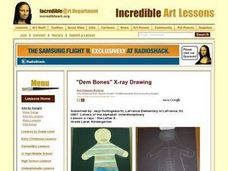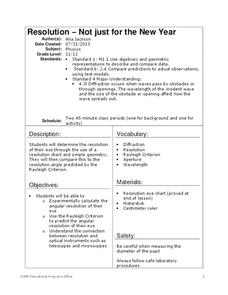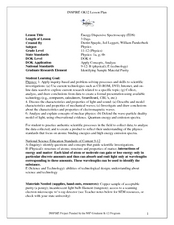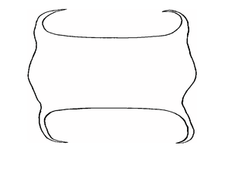Curated OER
X-Ray Eyes
Students observe Australian X-ray paintings for information and to understand the art techniques used. Then they imagine and draw the inner organs of an animal. Students also research the anatomy of the animal to analyze the accuracy of...
Curated OER
X-ray Spectroscopy and the Chemistry of Supernova Remnants
This link takes you to a comprehensive unit that delves into emission spectra and supernovas. There are four parts: How and where elements are created, electromagnetic radiation, spectroscopy, and the newest technology for studying our...
Curated OER
History of the X-Ray
Seventh graders discuss the history of the x-ray machine. In this social science lesson, 7th graders understand how a x-ray machine works. Students recognize that there have been many improvements to the x-ray machine over the...
Curated OER
x-rays - the Letter X
Students demonstrate the ability to draw vertical, horizontal, and diagonal lines, recognize the difference between inside and outside, and create a picture of themselves.
Curated OER
How Big Is That Star?
Aspiring astronomers study stars. They compare stars and explain the relationship between radius, mass, and diameter. By creating a star simulation, they discover how a binary star system's orbit can cause changes in the observed...
Curated OER
Make Your Own "Weather" Map
Pupils create their own "weather" map using data from x-ray sources. They analyze and discuss why it is important to organize data in a fashion in which is easy to read. They compare and contrast different x-ray sources using a stellar map.
Cornell University
Diffraction Demystified
Study diffraction patterns using CDs and DVDs! Scholars measure the diffraction patterns of a light wave as it hits a CD or DVD. Using the information, they can measure the distance between the tracks.
Curated OER
The Human Skeletal System: Inside and Out
Young scholars investigate the body. In this biology lesson plan, students will learn the basics of the bones in their body and about how they can be injured. Young scholars will participate in a total of seven activities designed to...
Curated OER
Norval Morrisseau
Students investigate the art of Norval Morrisseau and create "x-ray paintings" using styles and symbols related to his work in this one or two day art lesson plan for third grade through twelfth grade. Emphasis is placed upon creative...
Polar Trec
Staying Warm in Antarctica!
Has your class ever wondered how animals and scientists stay warm in the Polar Regions? Kids will investigate to understand the three types of heat transfer and how heat transfer affects those trying to stay toasty in sub-zero...
Curated OER
Catching Some Rays
Sixth graders explore the tilt of Earth's axis. In this Earth lesson, 6th graders read a Greek mythology story explaining why there are seasons. Students build a sun-ray gathering tool from styrofoam, glue, thermometers, skewers, and...
Curated OER
Tennis Balls in a Can
Make your classroom interesting by teaching or assessing through tasks. Deepen the understanding of Geometry and motivate young mathematicians. The task uses investigation with tennis balls and their container to prompt learners to...
Santa Monica College
Flame Tests of Metal Cations
Scientists used flame tests to identify elements long before the invention of emission spectroscopy. Young chemists observe a flame test of five metal cations in the fourth instructional activity of an 11-part series. Individuals then...
Cornell University
Resolution—Not Just for the New Year
Experiment with optical resolution using an inquiry-based lesson. Young researchers calculate fellow classmates' optical resolutions. They apply the information to understand the inner workings of optical instruments.
Curated OER
Practical Illustrations of Astronomical Concepts Relating to the Solar System
Eighth graders are introduced to concepts related to the Solar System. In groups, they participate in an experiment in which they must describe a ray of light and how it travels. They draw a diagram of the electromagnetic spectrum and...
Smithsonian Institution
Mobilizing Children
Scholars find out how the government used propaganda to mobilize children to help in the war effort. Lesson exercises include analyzing a quote from Franklin Roosevelt, viewing propaganda images and posters, and participating in a lively...
Curated OER
Understanding Cancer
Students study facts about cancer. In this cancer lesson, students read about cancer, cancer cells, cancer treatment, and research. They answer true or false questions on a worksheet before reading about cancer prevention.
Curated OER
Body Building
Students determine whether ancient Egyptian drawing was proportional and in perspective by comparing ancient Egyptian drawings, a mummy's x-ray, and contemporary photographs of people.
Curated OER
Electromagnetic Spectrum
High schoolers define electromagnetic radiation, list major categories and uses of electromagnetic waves, identify potential health risks with electromagnetic waves, and demonstrate understanding of Plank's constant by solving...
Curated OER
Energy Dispersive Spectroscopy
Students calculate the values of electron binding energies. In this physics lesson, students solve for different wavelength characteristics of X-rays. They present their findings to the class.
NOAA
Vertebrates I
I spy a spine. The 19th installment of a 23-part NOAA Enrichment in Marine sciences and Oceanography (NEMO) program explores vertebrate species, such as sharks and other fish. Learners take part in an activity evaluating the...
Curated OER
Heating the Earth
Middle schoolers explore how the angle of sunlight affects the Earth's temperature and seasons and then apply this understanding to their local situation.
Curated OER
Skates
Students gain understanding of structure, characteristics, and basic needs of living things and their role in world, identify parts of skate, observe details of skate's body and skate egg case, and identify unique characteristics of skates.
Curated OER
The Human Skeletal System: Inside and Out
Students study bone size, structure and shape. They use various geometrical shapes to make a skeleton and produce a poster depicting the skeletal system and its functions. They arrange the pictures into the five sections, glue on...























